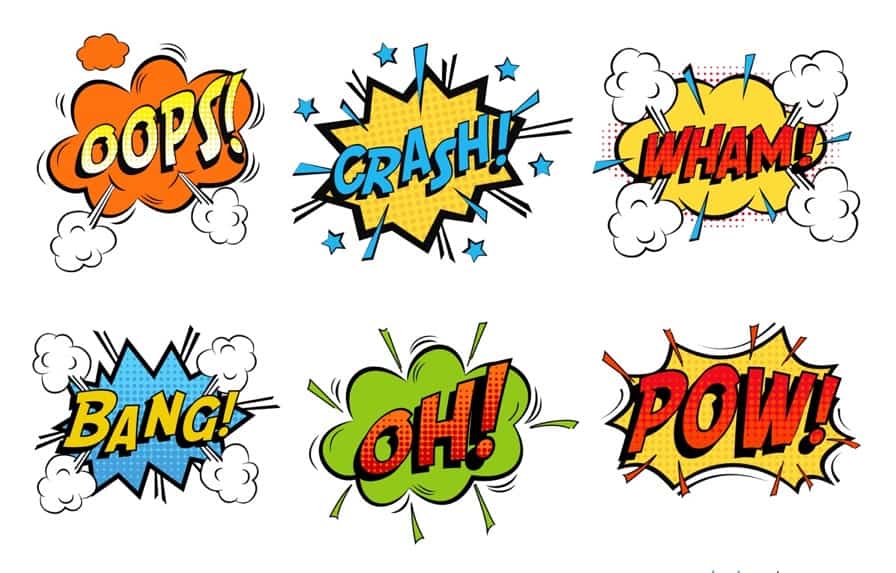English Onomatopoeias
When we were younger, our parents and teachers used to tell us about the different sounds that various objects and animals produce.
This is as simple as a game played with babies and toddlers that follows the sequence of “What sound does a blank make?” or “What does a blank say?”.
Enter, onomatopoeia.
This is a literary device defined as a word which imitates the natural sounds of a thing, and it plays an important role in a variety of linguistic settings. It’s the basis for how we learn our native language, it gives poetry and books an added level of richness, and it’s what makes our comic book heroes like Batman so amazing! PAM!
Common Onomatopoeia Examples
Onomatopoeic words that can either be a verb or a noun; consider the word “giggle”, that sound you make when something’s funny, but not quite to the level when you’re laughing. In some ways, it’s a sound effect that paints a vibrant portrait of what’s going on.
Let’s take a look at the following examples, in no particular order:
- The sheep went, “Baa.”
- The best part about music class is that you can bang on the drum.
- It is not unusual for a dog to bark when visitors arrive.
- Put your phone on silent so that it doesn’t beep during the movie.
- The cash register popped open with a heart-warming ca-ching.
- Her heels clacked on the hardwood floor.
- Nothing bugs me more than rapidly clicking your pen.
- If you’re going to cough, please cover your mouth.
- Juan had a hard time hearing the teacher over his grumbling
- If you have the hiccups, you should try drink a glass of water.
- If you see anyone coming, honk your horn.
- That cat will keep meowing until you pet it and will purr if you scratch him behind his ears.
- The kind man shared his bread with the quacking
- His car took off so quickly that the tires screeched.
- Benjamin loved the swish of the basketball net.
Animal Sounds
We all like to believe that animals have their own unique language; if that was true, I’d have a better idea why my cat Dexter insists on waking me up at six o’clock every morning.
But instead of speaking in actual words, animals make unique sounds that may easily be identified even without looking for its source. A great example of this is the classic children’s nursery rhyme and song “Old McDonald Had a Farm”.
Every language is different when it comes to onomatopoeia, but in English we’ve got the following common ones:
- Bark/woof (dog)
- Buzz (fly/insect)
- Chirp (bird)
- Cluck (chicken/hen)
- cock-a-doodle-doo (rooster)
- hiss (snake)
- meow/purr (cat)
- moo (cow)
- neigh (horse)
- oink (pig)
- quack (duck)
- ribbit (frog)
Onomatopoeias are words that can be fun and realistic representations of the sounds they define. If a sound exists in the world, chances are there is an onomatopoeic word which clatters or clacks, swooshes or slaps, or bings or bangs in line with it.
So, the next time you want to spice up your speaker or writing, consider tossing in an onomatopoeia or two. If nothing else, most of them are awfully fun to say, and a Batman reference never hurts – Kaboom! Pow!!
